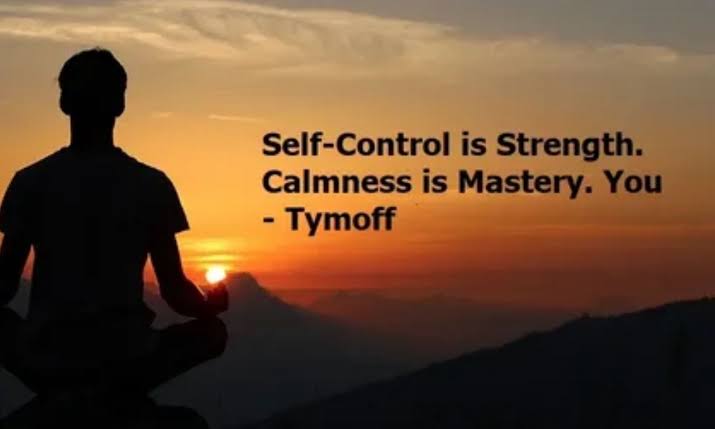In a world that constantly demands our attention, tests our patience, and pushes us to our limits, the ability to exercise self-control and maintain calmness is nothing short of a superpower. The quote, “Self-control is strength. Calmness is mastery. You – Tymoff,” encapsulates a profound truth about personal growth and emotional intelligence. These words remind us that true strength lies not in external achievements but in the mastery of our inner world. This article delves into the significance of self-control and calmness, exploring how these qualities can transform our lives and help us navigate challenges with grace and resilience.
The Power of Self-Control
Self-control is often misunderstood as a form of repression or denial. However, it is far from that. Self-control is the ability to regulate one’s emotions, thoughts, and behaviors in the face of temptations, impulses, and external pressures. It is the foundation of discipline, focus, and long-term success. When we exercise self-control, we are not suppressing our desires; rather, we are choosing to align our actions with our higher goals and values.
Consider the example of a student preparing for an important exam. The temptation to scroll through social media, watch a favorite TV show, or hang out with friends may be strong. However, the student who exercises self-control prioritizes their studies, recognizing that short-term gratification pales in comparison to the long-term benefits of academic success. This ability to delay gratification is a hallmark of emotional strength and maturity.
Self-control is also crucial in managing relationships. In moments of conflict or disagreement, it is easy to react impulsively, saying or doing things we may later regret. However, when we exercise self-control, we pause, reflect, and respond thoughtfully. This not only prevents unnecessary arguments but also fosters understanding and empathy. In this way, self-control becomes a tool for building stronger, healthier connections with others.
Calmness as Mastery
While self-control is about managing our actions, calmness is about mastering our emotions. Calmness is the ability to remain composed and centered, even in the face of chaos or adversity. It is not the absence of emotions but the ability to observe them without being overwhelmed. Calmness allows us to think clearly, make rational decisions, and respond to challenges with poise.
Imagine being stuck in a traffic jam on your way to an important meeting. The frustration and anxiety can easily take over, leading to stress and irritability. However, a person who has mastered calmness recognizes that the situation is beyond their control. Instead of succumbing to negative emotions, they take deep breaths, listen to calming music, or use the time to reflect on their day. By doing so, they transform a potentially stressful situation into an opportunity for mindfulness and relaxation.
Calmness is also a key component of effective leadership. Leaders who remain calm under pressure inspire confidence and trust in their teams. They are able to assess situations objectively, make informed decisions, and guide their teams through challenges. In contrast, leaders who react impulsively or emotionally often create an atmosphere of uncertainty and instability. Thus, calmness is not just a personal virtue but a professional asset.
The Synergy of Self-Control and Calmness
Self-control and calmness are deeply interconnected. Self-control provides the foundation for calmness, while calmness enhances our ability to exercise self-control. Together, they form a powerful synergy that enables us to navigate life’s challenges with resilience and grace.
For instance, consider the practice of meditation. Meditation is a powerful tool for cultivating both self-control and calmness. Through meditation, we learn to observe our thoughts and emotions without judgment, developing the self-control to let go of distractions and focus on the present moment. At the same time, meditation helps us cultivate a sense of inner peace and calmness, allowing us to approach life with a balanced and centered mindset.
Another example is the practice of mindful eating. Mindful eating involves paying attention to the taste, texture, and aroma of food, as well as recognizing hunger and fullness cues. This practice requires self-control to resist the temptation of overeating or indulging in unhealthy foods. At the same time, it fosters a sense of calmness and gratitude, transforming the act of eating into a mindful and enjoyable experience.
The Role of Self-Control and Calmness in Personal Growth
Self-control and calmness are not just qualities to be admired; they are essential for personal growth and self-mastery. They enable us to break free from destructive habits, overcome obstacles, and achieve our goals. Moreover, they empower us to live authentically, aligning our actions with our values and aspirations.
One of the most significant benefits of self-control and calmness is their impact on mental health. In a world where stress, anxiety, and burnout are increasingly prevalent, these qualities serve as a buffer against the pressures of modern life. By exercising self-control, we can avoid impulsive behaviors that exacerbate stress, such as overworking, overeating, or substance abuse. By cultivating calmness, we can reduce the impact of stress on our minds and bodies, promoting overall well-being.
Furthermore, self-control and calmness are essential for building resilience. Resilience is the ability to bounce back from setbacks and adapt to change. It is not about avoiding challenges but about facing them with courage and determination. Self-control allows us to stay focused on our goals, even when the path is difficult. Calmness enables us to approach challenges with a clear and composed mind, finding solutions rather than dwelling on problems.
Practical Strategies for Cultivating Self-Control and Calmness
While self-control and calmness are innate qualities, they can be developed and strengthened through practice. Here are some practical strategies to cultivate these qualities in your daily life:
- Mindfulness Meditation: Set aside a few minutes each day to practice mindfulness meditation. Focus on your breath, observe your thoughts and emotions, and cultivate a sense of inner peace.
- Set Clear Goals: Define your goals and priorities, and align your actions with them. This will help you stay focused and resist distractions.
- Practice Delayed Gratification: Challenge yourself to delay gratification in small ways, such as waiting a few minutes before checking your phone or saving a portion of your paycheck for future goals.
- Develop Healthy Habits: Establish routines that promote self-control and calmness, such as regular exercise, a balanced diet, and adequate sleep.
- Pause Before Reacting: When faced with a challenging situation, take a moment to pause and breathe before responding. This will help you respond thoughtfully rather than react impulsively.
- Practice Gratitude: Cultivate a sense of gratitude by reflecting on the positive aspects of your life. This will help you maintain a calm and positive mindset, even in difficult times.
Conclusion
“Self-control is strength. Calmness is mastery. You – Tymoff.” These words serve as a powerful reminder of the importance of mastering our inner world. Self-control and calmness are not just qualities; they are skills that can be developed and honed over time. By cultivating these qualities, we can navigate life’s challenges with resilience, achieve our goals, and live authentically. In a world that often feels chaotic and unpredictable, self-control and calmness are the keys to inner peace and lasting success. So, take a deep breath, embrace the power within you, and embark on the journey of self-mastery.
Read more: learn to sit back and observe. not everything need – tymoff



